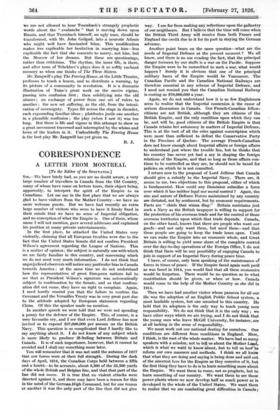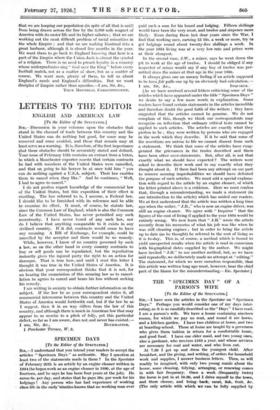CORRESPONDENCE
A LETTER FROM MONTREAL
[To the Editor of the SPECTATOR.] Sin,ŌĆöWe have lately had, as you are no doubt aware, a very large number of travellers in Canada from the Old Country, many of whom have come on lecture tours, their object being, apparently, to interpret the spirit of the Empire to us Canadians. Let me say in the first place that we are always glad to have visitors from the Mother CountryŌĆöwe have no more welcome guests. But we have had recently an extra large number of visitors who seem to have it firmly fixed in their minds that we have no sense of Imperial obligation, and no conception of what the Empire is. One of them, whose name I will not mention, gave several addresses and explained his position at many private entertainments.
- In the first place, he attacked the United States very violently, claiming that all European troubles were due to the fact that the United States Senate did not confirm President Wilson's agreement regarding the League of Nations. This is a matter of opinion ; the subject is naturally one with which we are fairly familiar in this country, and concerning which we do not need very much information. I do not think that unprejudiced observers will notice any particular bias in Canada towards America ; at the same time we do not understand how the representatives of great European nations fail to see that as President Wilson's signature was automatically subject to confirmation by the Senate, and as that confirm- ation did not come, they have no right to complain. Again, I need hardly remind you that the failure to confirm the Covenant and the Versailles Treaty was in very great part due to the attitude adopted by European statesmen regarding China. Of this the speaker made no mention.
In another speech we were told that we were not spending a penny for the defence of the Empire. This, of course, is a very favourite cry, and I see that even Lord Jellicoe has now invited us to expend $37,000,000 per annum on the British Navy. This question is so complicated that I hardly like to say anything about it. I do not know of any subject which is more likely to produce - ill-feeling between Britain and Canada. It is of such importance, however, that it cannot be avoided and I shall say something more later.
You will remember that it was not until the autumn of 1917 that our forces were at their full strength. During the dark days of April, 1918, the Canadian Corps held between a fifth and a fourthŌĆöto be accurate, about 6,500 of the 35,500 yards of the whole British and Belgian line, and that that part of the line did not move. It is true that no violent attacks were directed against it, and there may have been a reason for this in the mind of the Gerinasaligh Command, but for one reason or another it was the - only _part of the line that did not give way. I am far from making any, reflections upon the gallantry of our neighbours. But I believe that the time will come when the British Third Army will receive from both France and England the credit due to it for its part in staying the German advance.
Another point bears on the same questionŌĆöwhat are the needs of Imperial Defence at the preient moment ? We all know, and there is no use evading the fact, that the principal danger foreseen by our staffs is a war on the Pacific. Suppose the Empire were to be committed to such a war, what would happen ? Surely it is obvious that one of the principal military bases of the Empire would be Vancouver. The Canadian Pacific and the Canadian National Railways are therefore essential in any scheme of Imperial Defence, and I need not remind you that the Canadian National Railway is costing us $70,000,000 a year.
Again, we do not understand how it is so few Englishmen seem to realize that the Imperial connexion is the cause of serious dissensions in Canada. Our French-Canadian fellow- citizens are not British, although they are citizens of the British Empire, and the only condition upon which they can be, and will be, good citizens of the British Empire is that Canada retains her autonomy in matters of Imperial Defence. This is at the root of all the cries against conscription which were more than sufficient to defeat the Conservative Party in the Province of Quebec. The average French-Canadian does not know enough about Imperial affairs or foreign affairs to understand just where the trouble lies, but he thinks that his country has never yet had a say in shaping the foreign relations of the Empire, and that so long as those affairs con- tinue to be controlled as they are, he should not be taxed for policies on which he is not consulted.
I return now to the proposal of Lord Jellicoe that Canada should give a subsidy to the Imperial Navy. There are, it seems to me, two objections to this proposal, either of which is fundamental. How could any Dominion subsidize a force over which it has neither legal nor moral control ? Again, the size and nature of Defence Forces maintained by any country are dictated, not by sentiment, but by economic requirements. Facts are " chiels that winna ding." Britain maintains just such a Navy as the British taxpayer is willing to support for the protection of his overseas trade and for the control of thoie overseas territories upon which that trade depends. Canada, on the other hand, knows that there are people who want our goodsŌĆöand not only want them, but need themŌĆöand that these people are going to keep the trade lanes open. Until we can make the Empire into an economic whole, and Great Britain is willing to yield some share of the complete control over the day-to-day operations of the Foreign Office, I do not think that there will be any possibility of engaging Canada to join in support of an Imperial Navy during peace time.
I have, of course, only been speaking of the maintenance of forces in times of peace. If the Empire faced again such peril as was faced in 1914, you would find that all these economics would be forgotten. There would be no question as to what contribution should be given, or when or how. Canada would come to the help of the Mother Country as she did in 1914.
Then we have had another visitor whose panacea for all our ills was the adoption of an English Public School system, a most laudable system, but one unsuited to this country. He held that its adoption is the only way to teach young men responsibility. We do not think that it is the only way ; we have other ways which we are trying, and I do not think that the young men who leave McGill University, for instance, are at all lacking in the sense of responsibility.
We must work out our national destiny for ourselves. Our conditions are different from conditions in England. Here, I think, is the root of the whole matter. We have had so many speakers with a mission, not to tell us about the Mother Lead, which is what we watt to know about, but to tell us hoveto reform our own manners and methods. I think we all kneriv that what they are doing and saying is being done and said out of the sincerest love for the Empire as they conceive of it, but the first thing they have to do is to learn something more about the Empire. We want them to come, not as propheLs, but to learn something of our country. We want theth to see those power-plants where we now develop half as much power as is developed in the whole of the United States. We want them to realize that we are combating great difficulties in Canada ; -that we are keeping our population (in spite of all that is said) from being drawn across the line by the 3,000 mile magnet of America with its easier life and its higher salaries ; that we are working out the most difficult problem of racial minorities in the whole Empire ; and that we are making Montreal into a great harbour, although it is _closed Ave months in the year. We want them to go back to England knowing that here is a .part of the Empire where the Union Jack is alniost the symbol of a religion. There is no need to preach loyalty in a country whose undergraduates sing " God save the King " before every football match, not as a matter of show, but as a matter of course. We want men, plenty of them, to tell us about England's needs and England's difficulties. But we want disciples of Empire rather than apostles.ŌĆöI am, Sir, &c.,
YOTJR MONTREAL CORRESPONDENT.























































 Previous page
Previous page